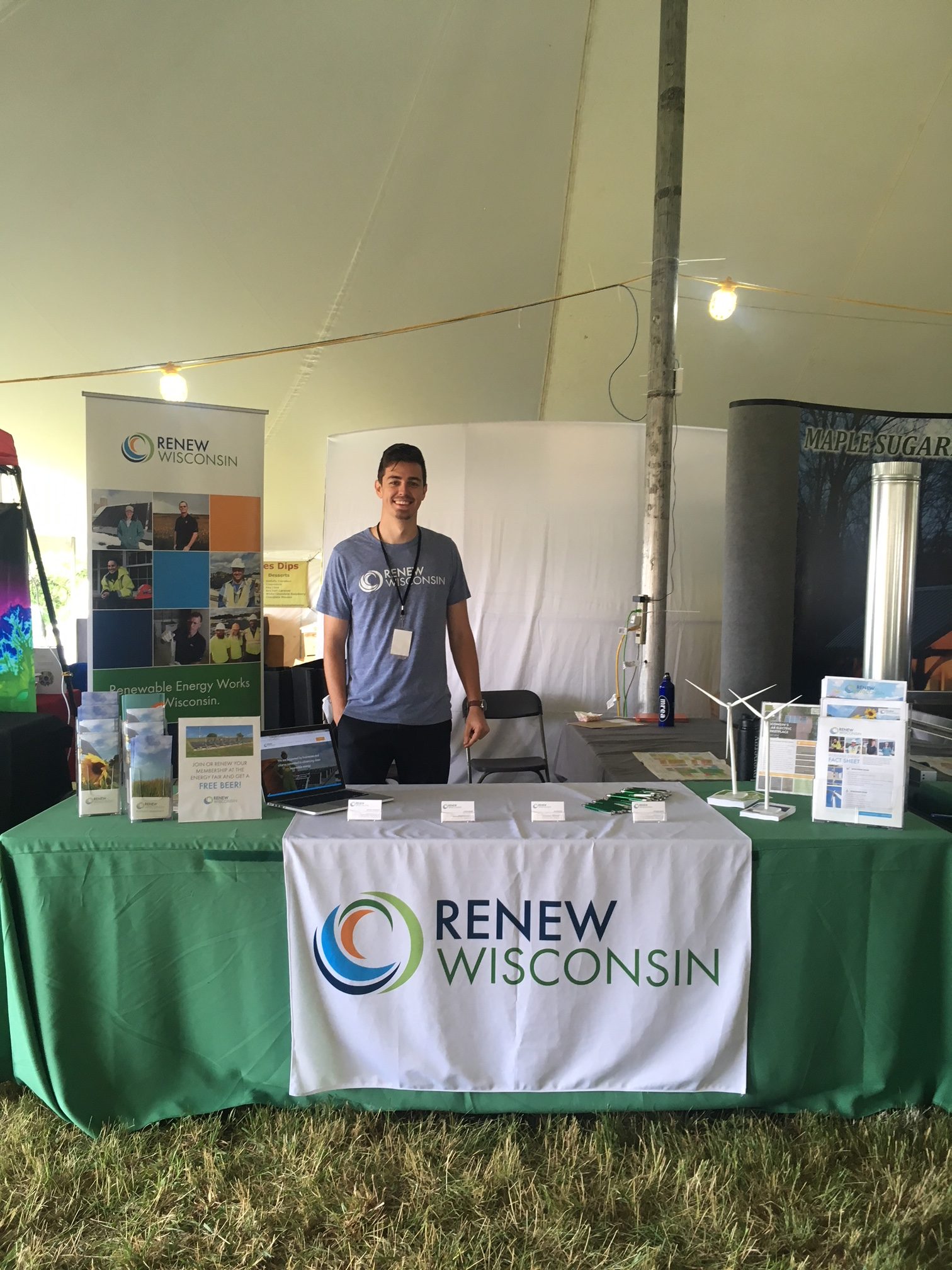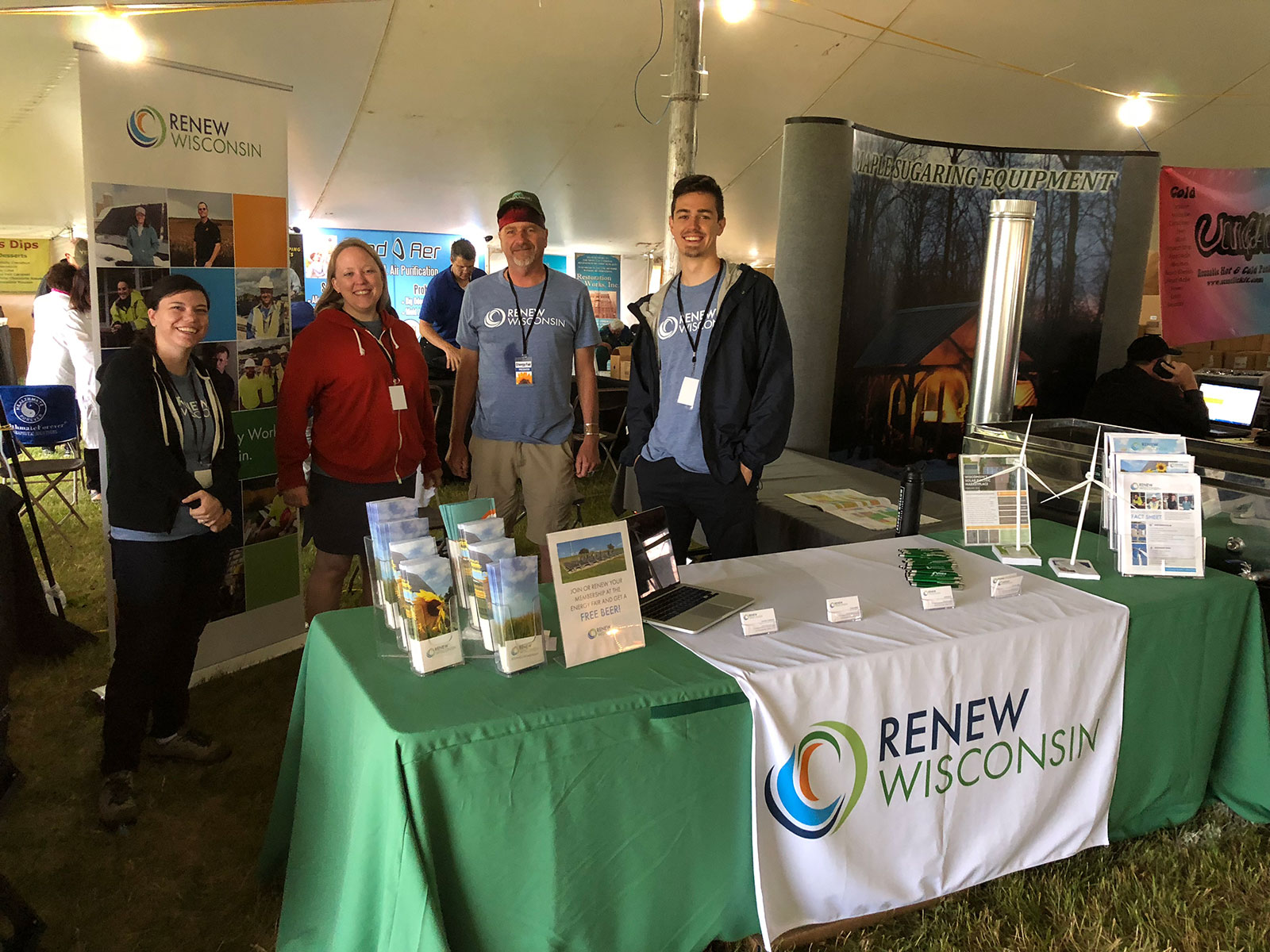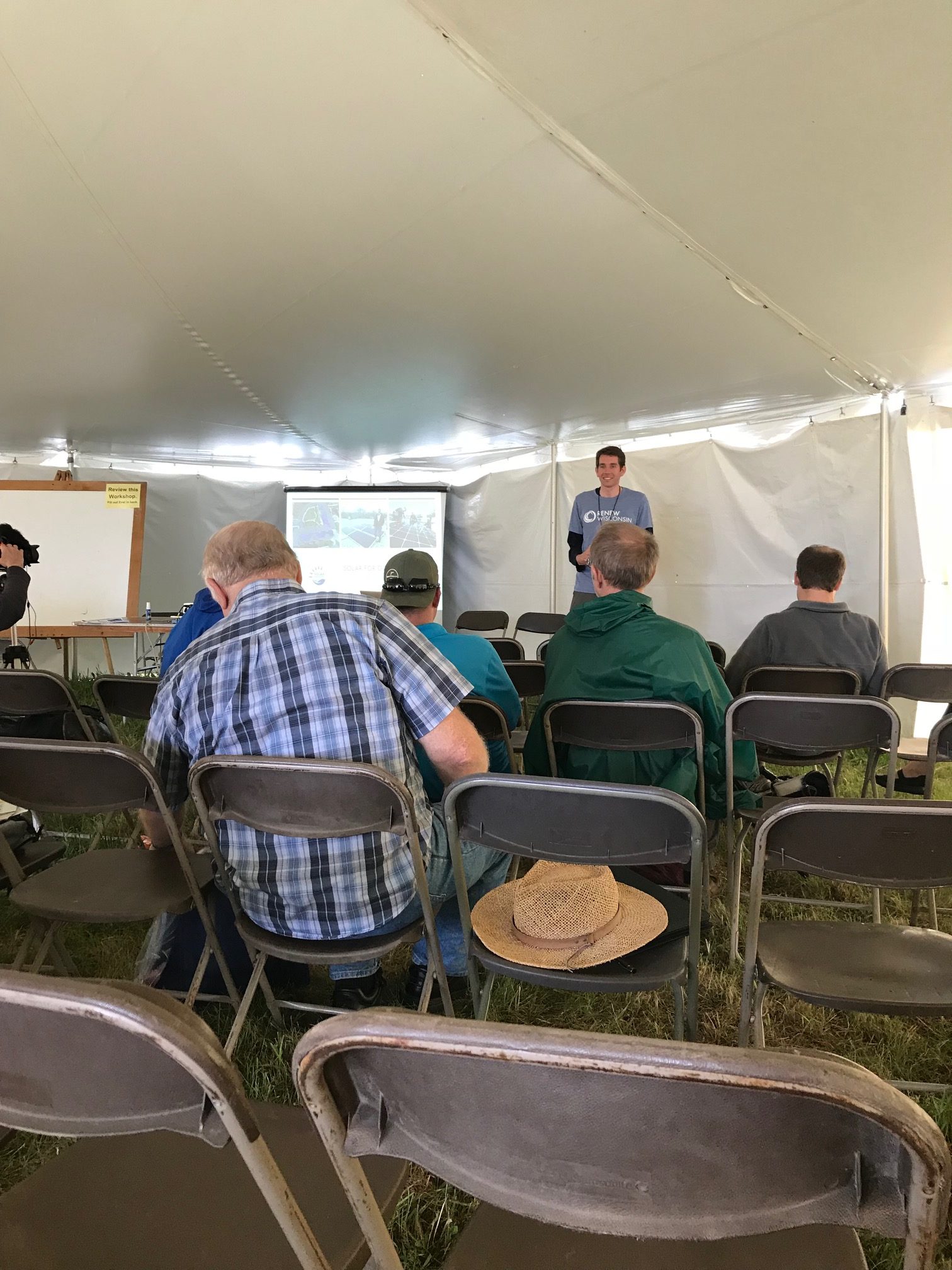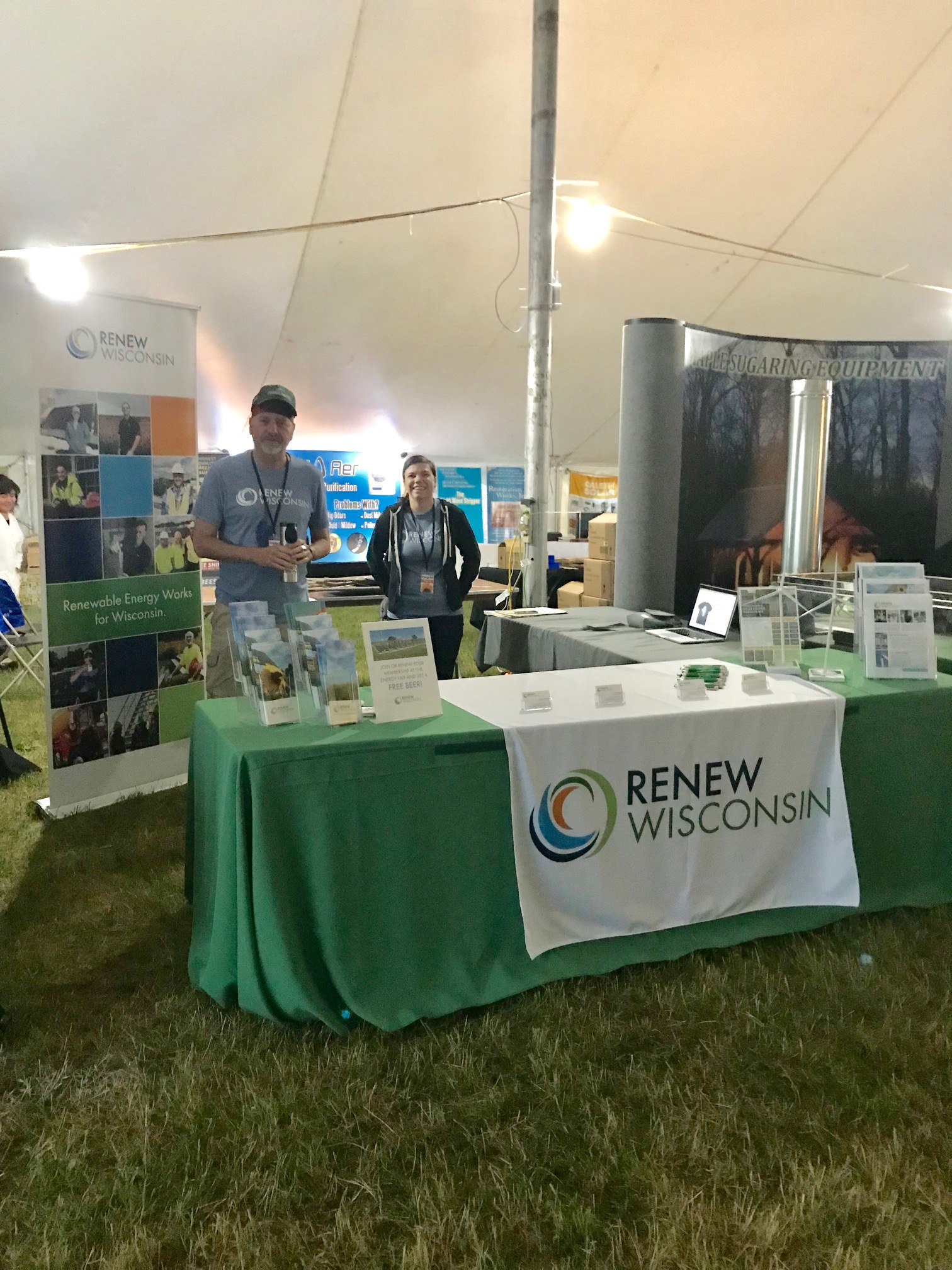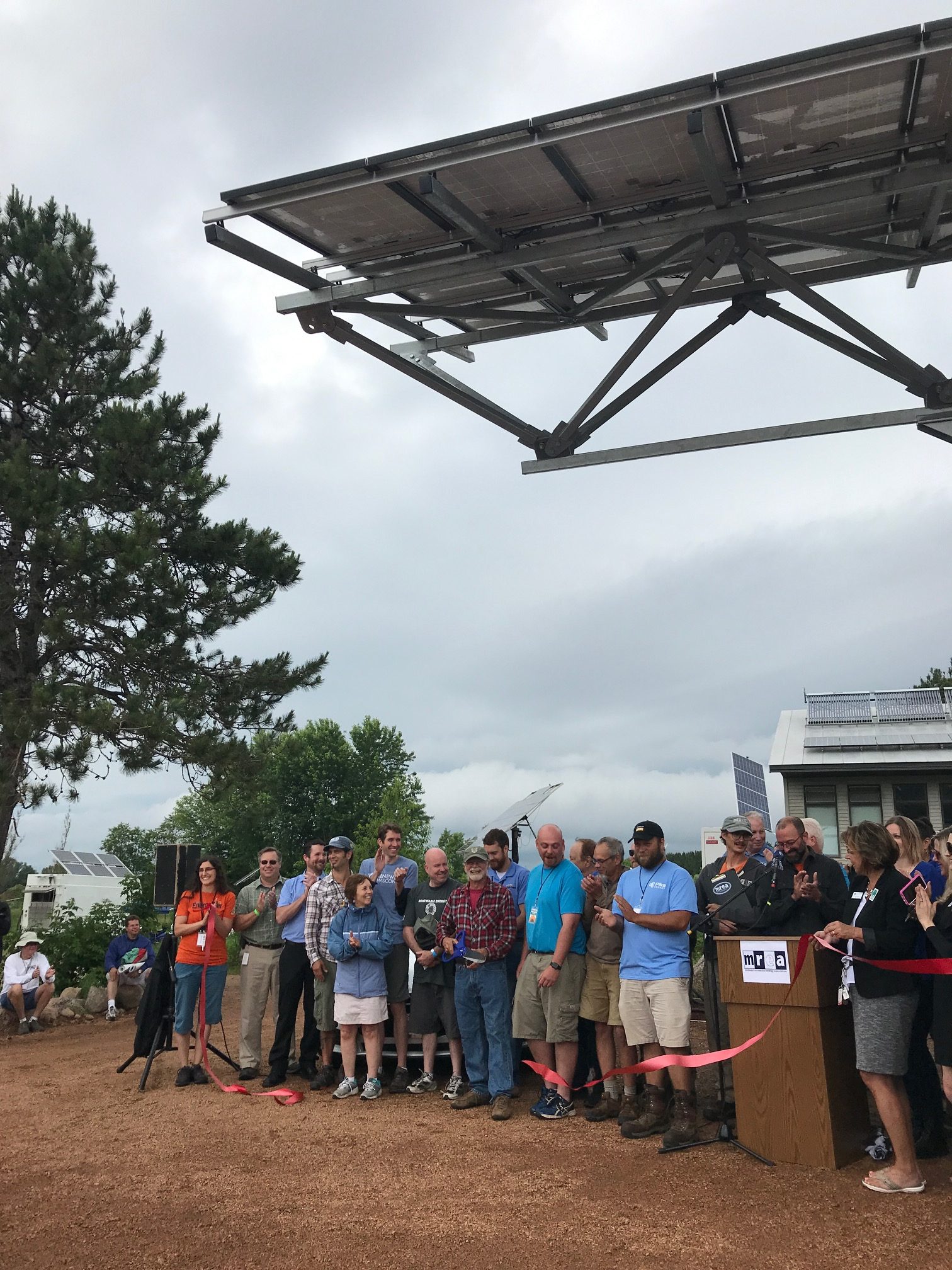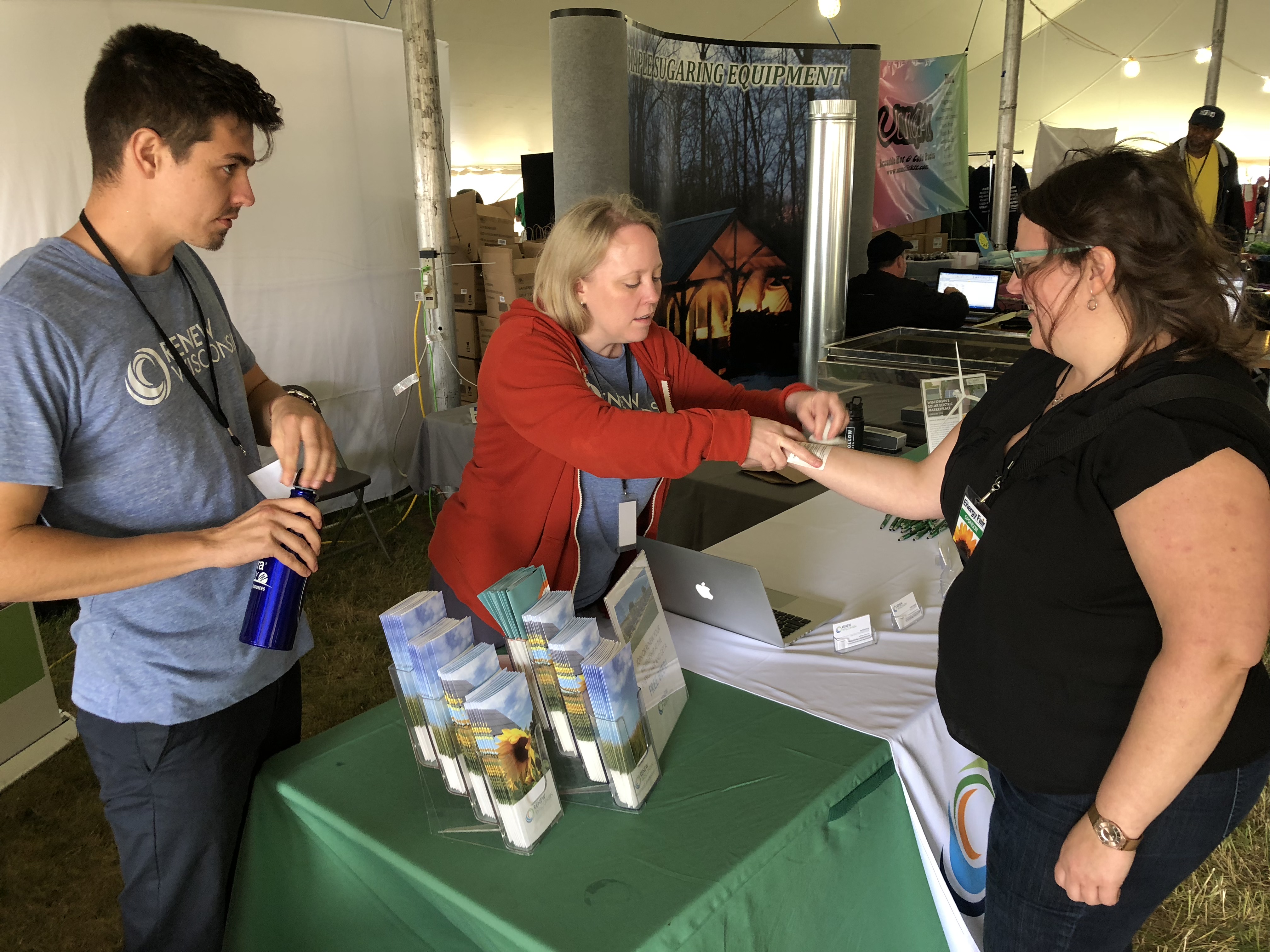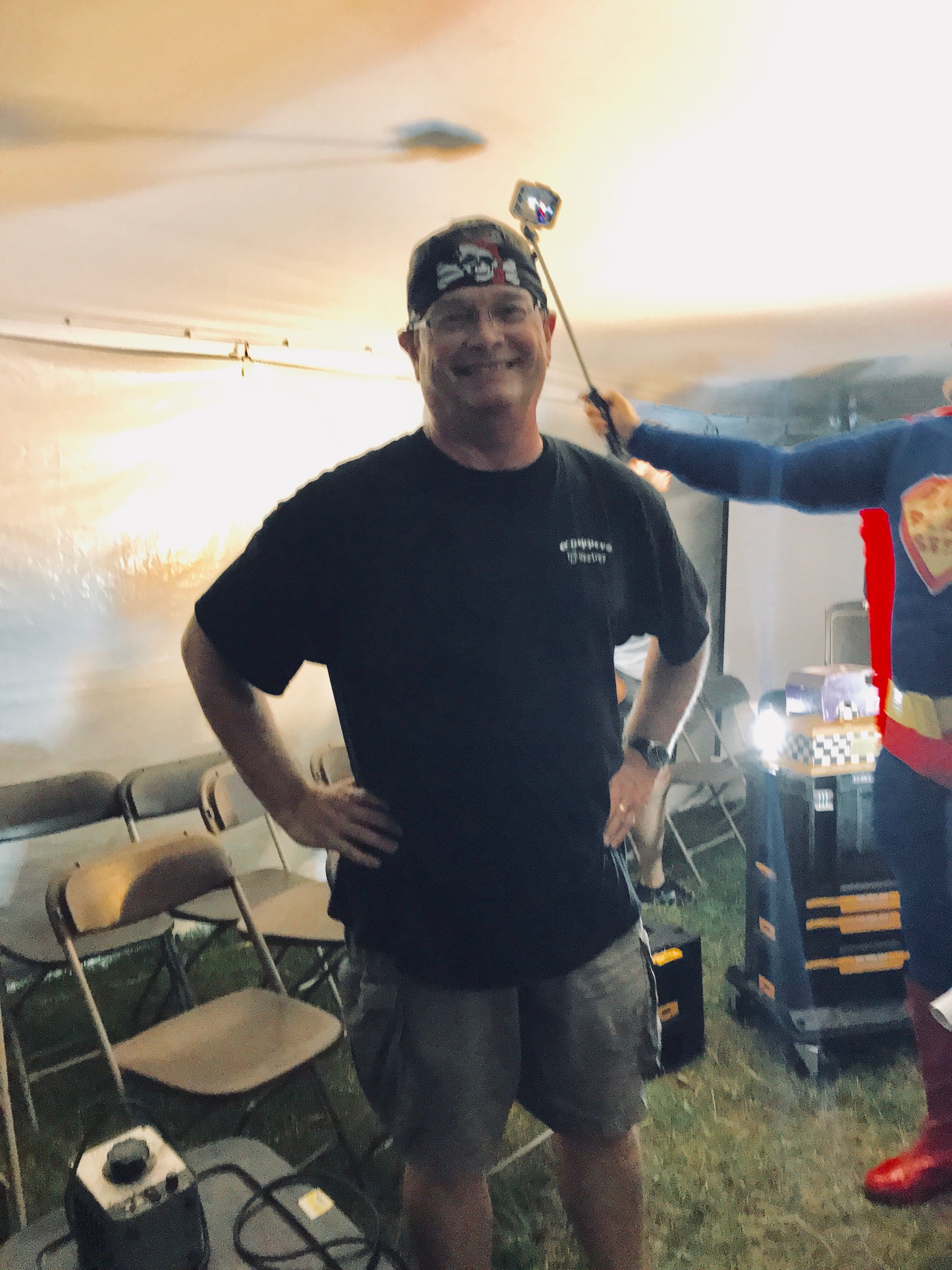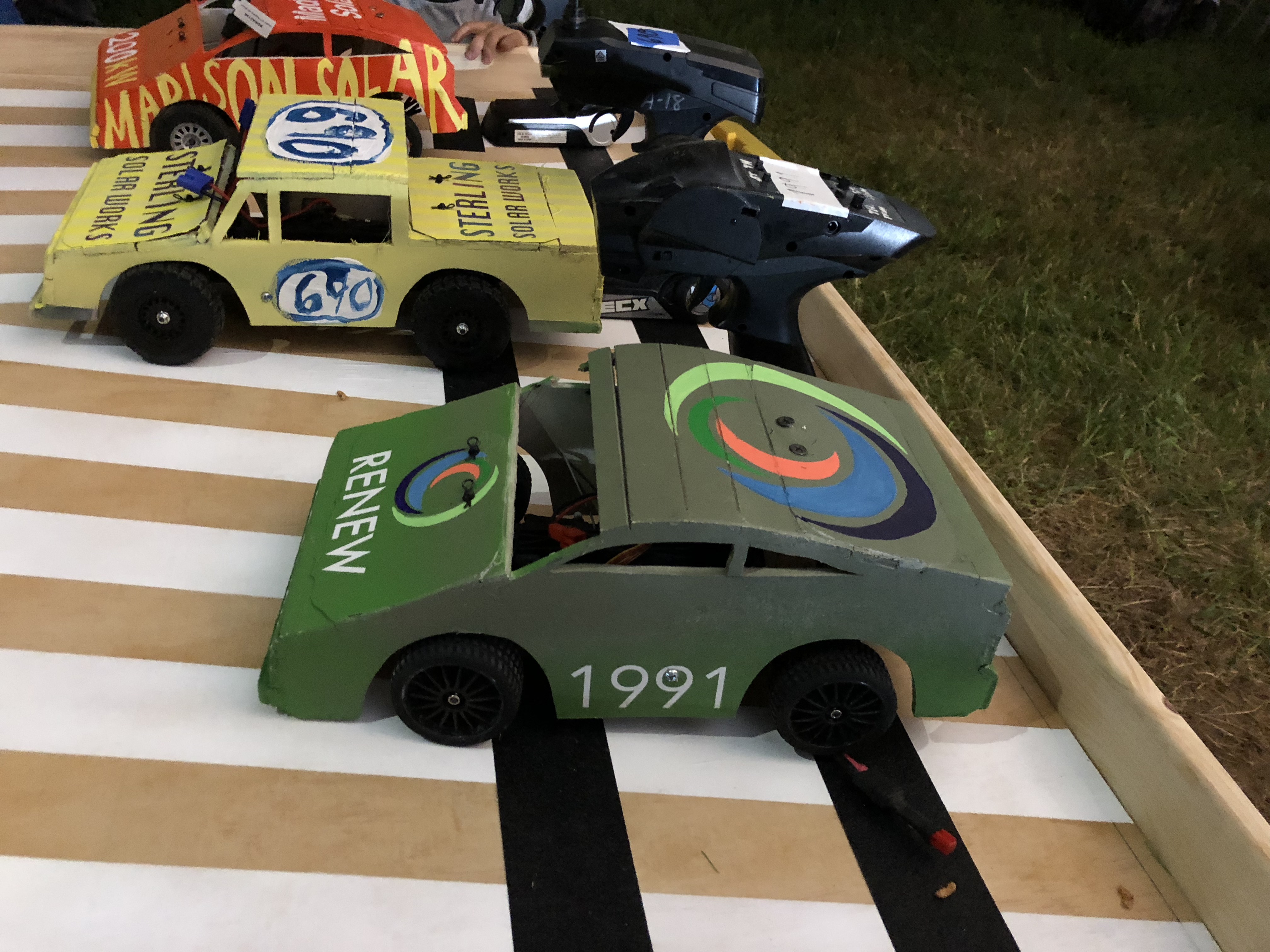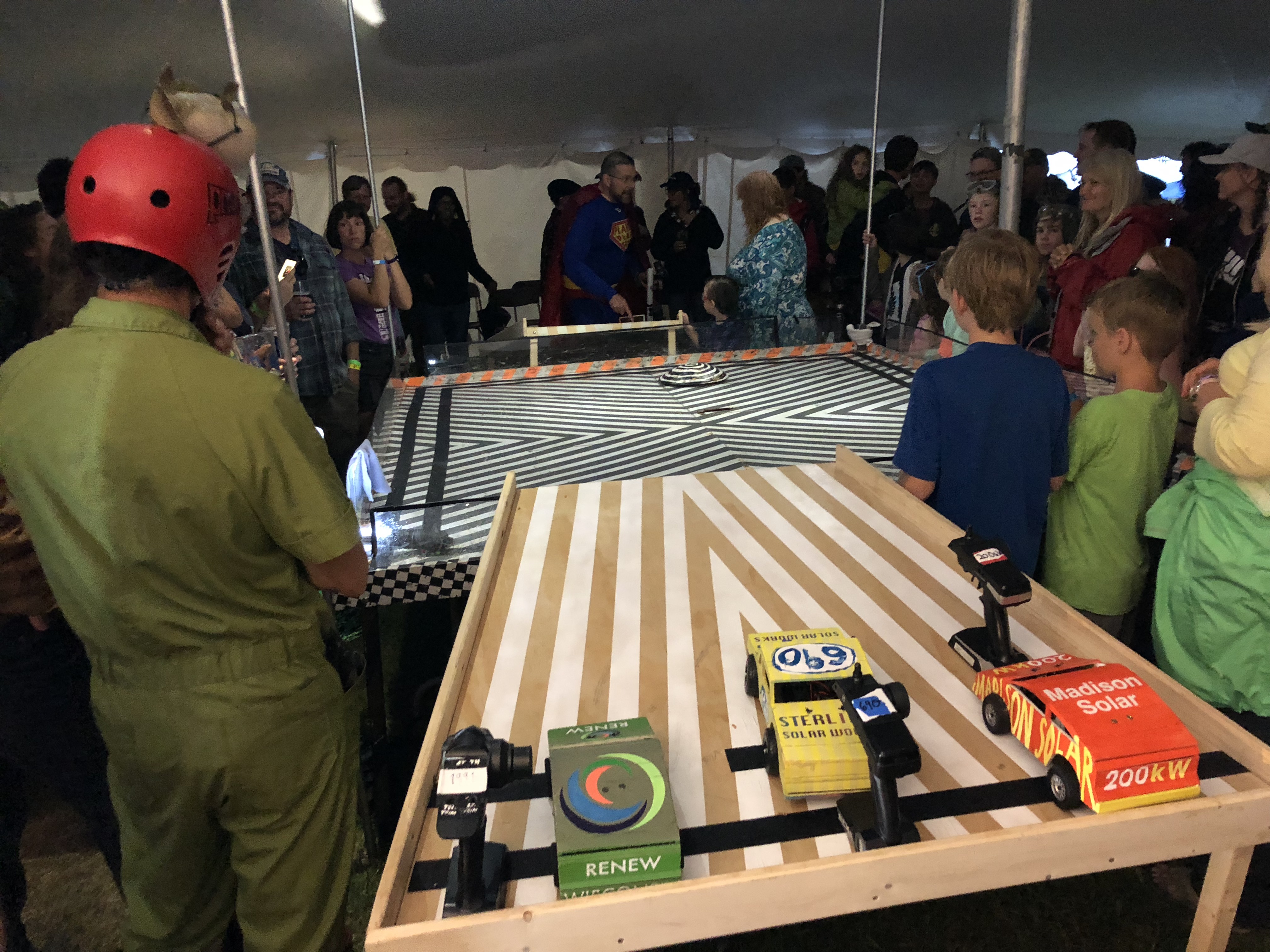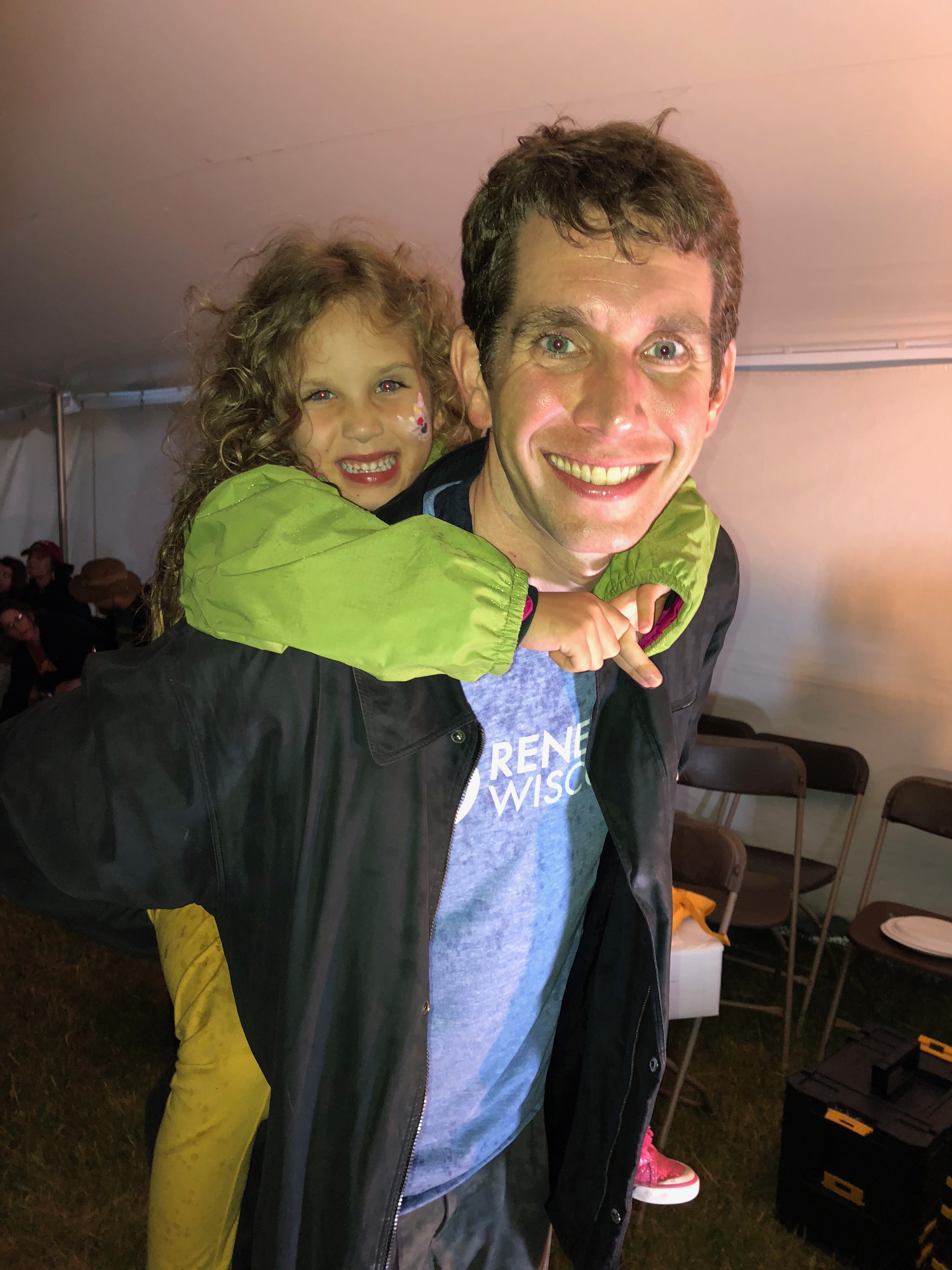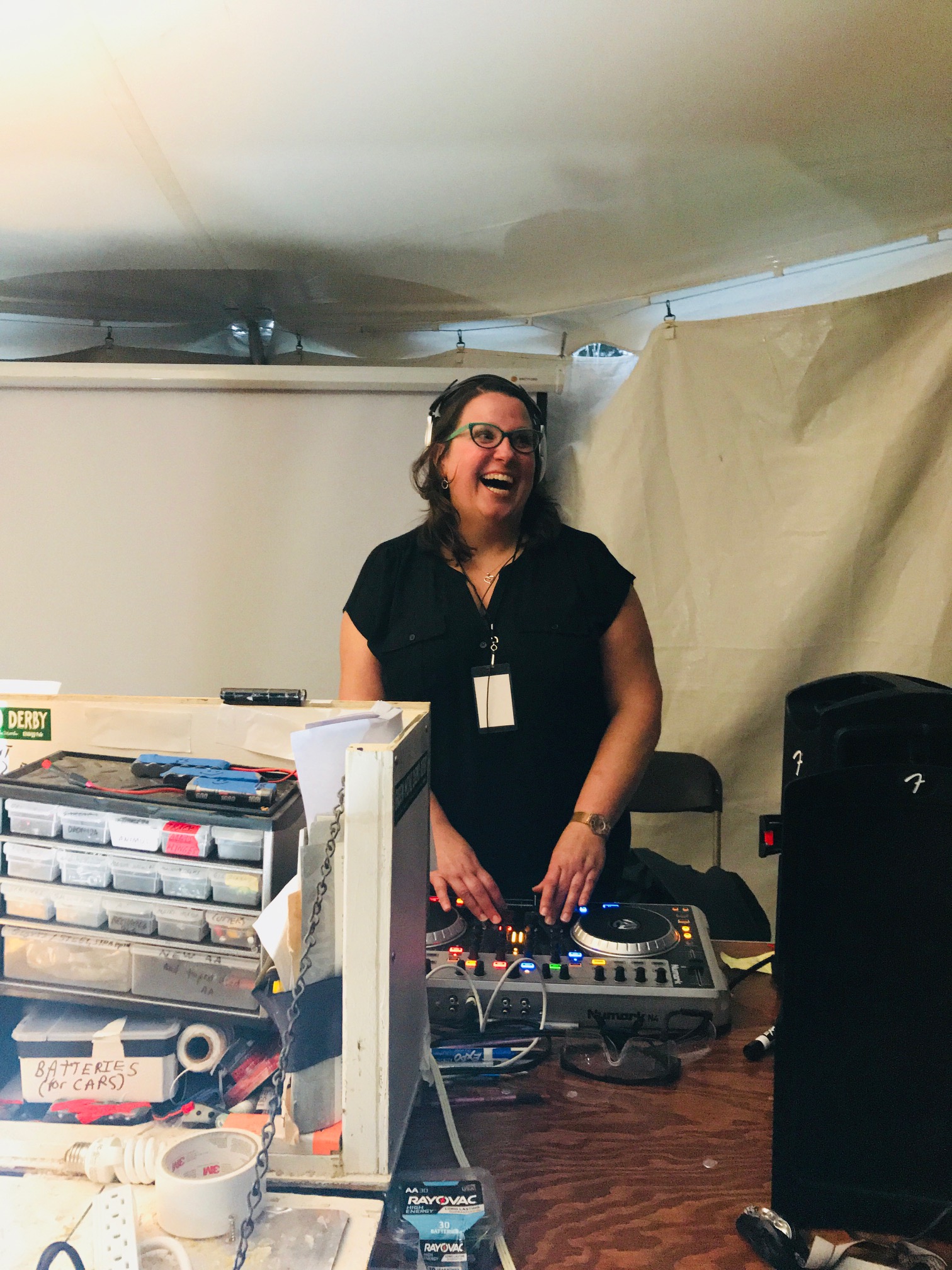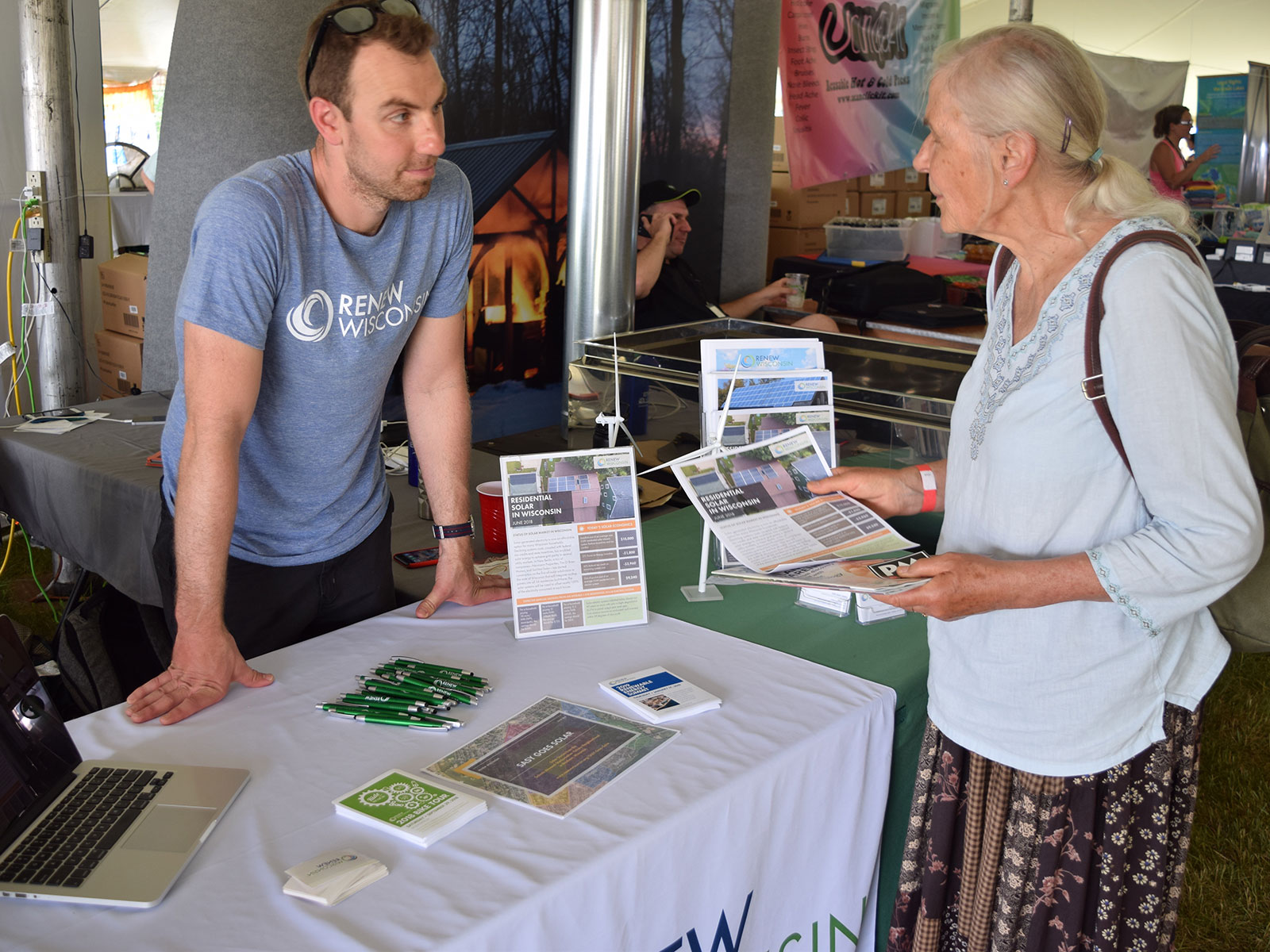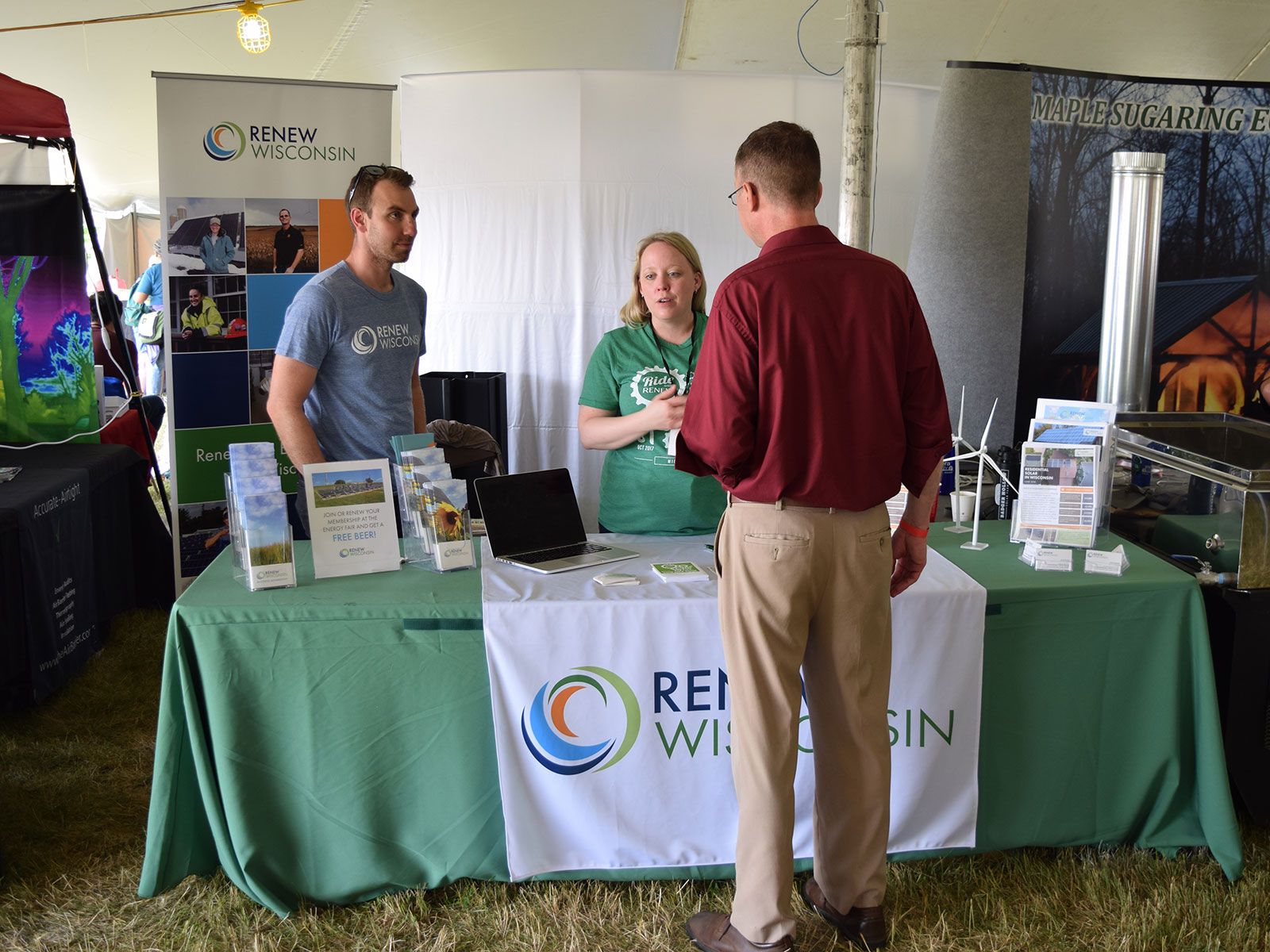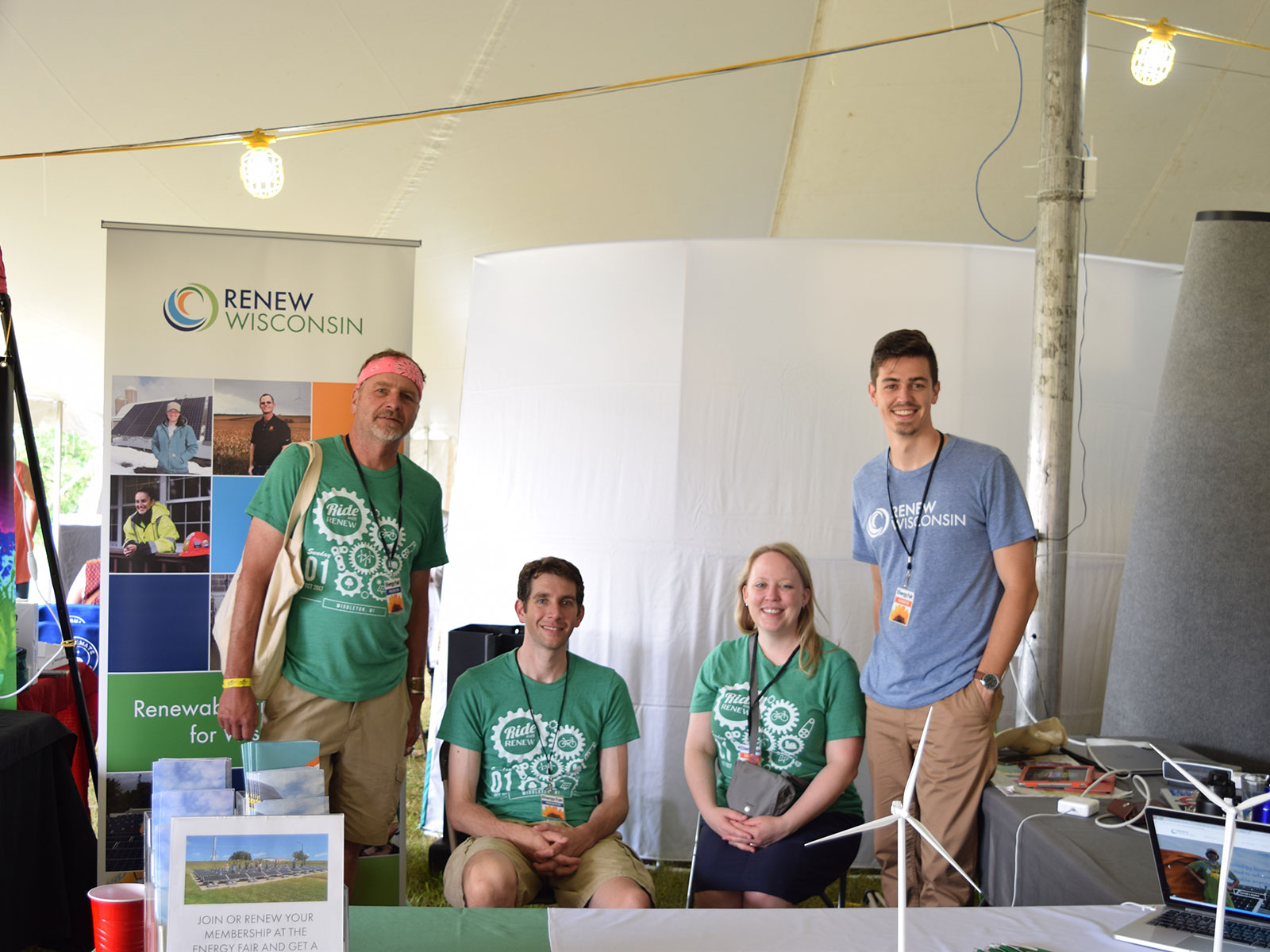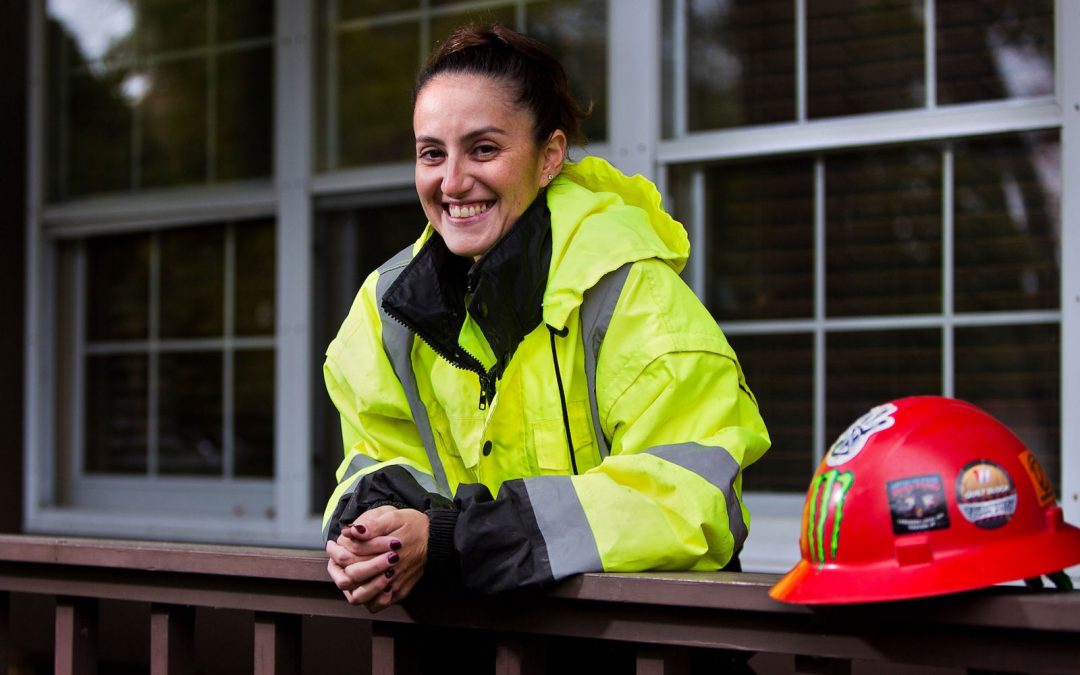
by Jodi Jean Amble | Jul 25, 2018 | RENEW Wisconsin, Renewables, Solar, Wind
Last fall, I was asked to help promote a series called Names behind the Numbers, profiling Wisconsin’s renewable energy workers. One of the interviews featured April Smith (pictured above), a construction worker on the Quilt Block Wind Farm in Darlington, WI. In describing her work she said “All the people, the company, and the community — everyone looked out for each other” and I thought “that’s Wisconsin.”
I grew up in the northeast corner of Iowa County, in the Wisconsin River valley in a small town called Arena. My grandmother cleaned houses, my dad was a mechanic turned landscaper, and my uncles worked road construction. I was surrounded by the grit and community that defines the Wisconsin work ethic; I was taught to work hard, work together, and get the job done.
Now I am one of Wisconsin’s clean energy workers. I joined the RENEW Wisconsin staff a year ago with an untraditional background: an arts education, a theater and music career, and eight years of marketing for a general contractor in Chicago. I knew little about renewable energy, but I cared about the environment and wanted to help build a cleaner future for my children.
According to the Department of Energy’s 2017 US Energy and Jobs Report Wisconsin, over 67,000 people are already working in clean energy, and renewable energy job growth is six times faster than overall job growth in the state. Wisconsin has the opportunity to increase renewable energy substantially in the coming decades, and create tens of thousands of jobs along the way.
After April’s story was published, I was able to attend the Quilt Block dedication and ribbon cutting in Darlington, WI. I witnessed firsthand a community (comprised of local landowners, businesses, educators, government officials, and EDP Renewables) working together to build a 98 MW wind farm, enough to power 25,000 Wisconsin homes with clean energy. This project created approximately 100 full-time jobs during construction and 12 permanent jobs.
I recently attended an outdoor BBQ at the local office of the proposed Badger Hollow Solar Project in Monfort, WI. This was an opportunity for local landowners to get together and see which of their neighbors would be growing a solar crop. There, I met Tracy Fillback, the local liaison hired to address questions and concerns from the landowners and the community as this project progresses. She spent the last few years at home raising her children and now she’s starting a new chapter as part of of the Badger Hollow Solar project. She is another example of renewable energy job opportunity in Wisconsin.
Wind developers are scoping out new projects in rural parts of the state and in recent weeks two proposals for large scale solar farms have joined Badger Hollow Solar at the review stage of development. While we can’t predict the exact number of jobs this will mean for Wisconsin, these companies and workers will spend millions of dollars on locally-sourced gravel, concrete, construction supplies, food, lodging and other services. Increasing renewable energy is one of the best economic development moves Wisconsin could make, particularly for its rural communities.
Wisconsin’s renewable energy workers are building a cleaner future for our children and they’re doing it the Wisconsin way; with tenacity, community, and hard work. Renewable energy can support our local economies and be as homegrown as the crops in our fields, if our communities can continue to embrace the possibilities.
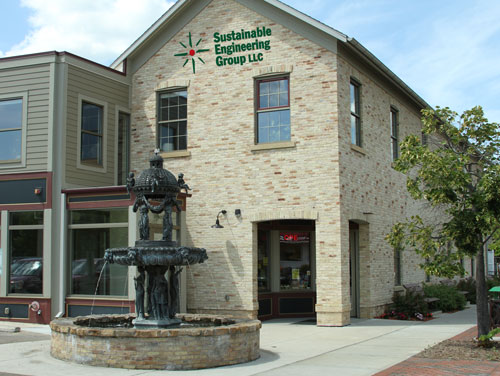
by Jodi Jean Amble | Jul 10, 2018 | Sustainability
Acquisition Broadens HGA’s Expertise in Sustainable Energy Planning
MILWAUKEE — HGA has acquired the Sustainable Engineering Group (SEG) in Madison, Wisconsin, a leading engineering firm focused on energy optimization and sustainable design. The acquisition reinforces and broadens HGA’s existing expertise in energy and infrastructure planning and design for leading national clients in healthcare, academic, corporate, and public sectors.
“SEG’s approach and deep knowledge will allow us to better serve the energy needs of our growing client base,” said Rick Hombsch, PE, LEED AP, vice president and HGA’s Energy & Infrastructure market leader. “Their team brings technical insights into emerging energy technologies and renewable resources that build on our existing strengths in high-performance energy systems, commissioning, retro-commissioning, energy auditing, and central energy plants. By combining forces, we are creating a more robust in-house practice that will enhance our capabilities to research, plan, and implement highly advanced energy systems that benefit our clients economically and environmentally.”
Founded in 2004 by Manus McDevitt, PE, LEED AP, and Svein Morner, PE, PhD, LEED AP, Sustainable Engineering Group quickly established itself as a regional leader in energy systems modeling, commissioning, retro-commissioning, LEED certification, and advanced research, with specialized focus in geothermal systems, renewable energy systems, and carbon reduction/net zero campus planning.
McDevitt has more than 25 years of experience in energy-efficient HVAC design and engineering systems. Morner has comparable tenure in mechanical engineering, with a research focus in thermal storage systems, energy self-sufficient buildings, fuel cell design, and solar panels.
SEG’s 12-person team works out of an historic commercial building that has achieved net zero energy using strategies that include waste heat recovery, natural ventilation, a photovoltaic roof system, and real-time energy-use monitoring.
“Clients are concerned about reducing their carbon footprint and exploring the most efficient designs for the life of their buildings,” said McDevitt. “HGA has a demonstrated track record as well as a clear sense of responsibility around designing healthy, energy-efficient buildings—which aligns with our mission. Joining HGA provides the opportunity for our team to work with a more diverse portfolio of clients and project types, to build our expertise in new technologies and research; it allows us to expand our scope to make an even more significant, positive impact on the built environment, which is our real passion.”
Both firms have extensive experience in energy and infrastructure planning and design. Here are just some examples of their work:
SEG
HGA
The SEG acquisition is part of HGA’s strategic focus on elevating its national excellence in sustainable design and energy planning. With the addition of Lisa Matthiessen as National Sustainable Design Director in 2017, HGA is building new structures and deepening its expertise to explore new directions in planning healthy buildings that help create a more profound impact for clients and end users.
The acquisition is effective July 1, 2018. SEG officially will change its name to HGA and merge operational and administrative functions.
About HGA
HGA is a national multi-disciplinary design firm rooted in architecture and engineering. Founded in 1953, we believe that enduring, impactful design results from deep insight into the people and passions that animate each unique environment. Our nine offices from coast to coast craft specialized teams to serve clients in education, arts, healthcare, corporate, government, community, and energy industries. Visit HGA.com or follow us on Facebook or Twitter.
CONTACT:
Erika Eklund, HGA (612) 758-4000
Gretchen Reisetter, Evans Larson (612) 338-6999
E-mail: Gretchen@EvansLarson.com
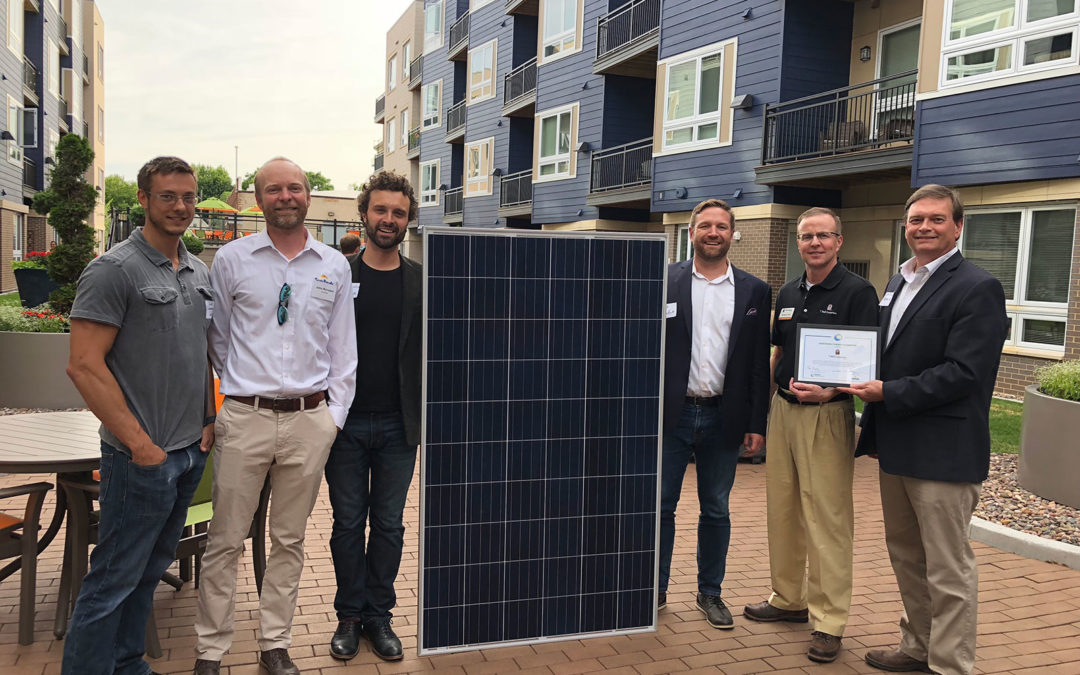
by Jim Boullion | Jun 28, 2018 | Biogas, Solar
Puerto Rico Learns about Renewable Energy in Madison
On May 29th Madison Mayor Paul Soglin asked RENEW Wisconsin to join him and his staff to meet with Bernardo Márquez Garcia, Mayor of Toa Baja, Puerto Rico, as they discussed some of the renewable energy initiatives that Madison has in place and ways that cities in Puerto Rico might use renewable energy to help reestablish electric service and make it more reliable.
“That is so important because in the remote areas of the island and so many critical areas of the city there is a need when the hurricane strikes, when the power system goes down, to have electric power,” Soglin said.
Bubolz Nature Preserve Unveils Off-Grid Microgrid
On May 31st I was very excited to head to Appleton where Faith Technologies, in partnership with Schneider Electric, unveiled the state-of-the-art, clean energy microgrid they designed and built at the Gordon Bubolz Nature Preserve in Appleton.
As one of the keynote speakers at the event, Senator Roger Roth praised the project and the Bubolz Nature Preserve for the great work they do. Many other local officials were on hand to learn more about the project including Senator Rob Cowles, Representative Mike Rohrkaste and Outagamie County Executive Tom Nelson.
As one of the most advanced microgrids in existence, the Gordon Bubolz Nature Preserve project acts as a testing and demonstration site for increasingly sophisticated microgrid operations, showing how advanced controls and operation optimization combined with state of the art technology can work together to provide clean, reliable power.
The advanced microgrid uses a 200-kW solar photovoltaic array; C-Series Proton On Site Hydrogen Generator; 30-kW hydrogen fuel cell; a 100-kW Tesla lithium-ion battery storage system; a 65-kW micro-turbine; and a 60-kW Kohler natural gas generator. Together they allow the system to completely disconnect from the utility grid and still operate the 18,000-square-foot nature center building, with power to spare!
Crave Brothers Open House
On June 13th I visited the Crave Brothers Dairy Farm in Waterloo for a very well attended Green Energy Showcase event designed to educate the public and government officials about their unique operation that integrates raising crops, a dairy farm, cheese making operation and a biodigester system.
Attending the event were Wisconsin DATCAP Secretary Sheila Harsdorf, State legislative staff and U.S. Deputy Secretary of Agriculture Steve Censky. While addressing the crowd, Censky praised the Crave Brothers operation, “There are many wonderful innovations happening in agriculture,” he said, “This is just one example of those projects.”
The two 750,000-gallon biodigester tanks located on the farm process manure from 2,600 cows. Other organic byproducts, such as cheese whey and food waste, also go into the biodigester, producing enough methane to generate 633 kilowatts of electricity from the adjacent generator, enough electricity to power the farm, the cheese factory and more than 300 homes in the Waterloo area.
T-Wall Enterprises Leading the Way on Multi-Family Solar
On June 14th RENEW Wisconsin recognized T-Wall Enterprises with a “Renewable Energy Champion” award for their support of renewable energy. T-Wall worked with SunPeak to install solar arrays on four of its multifamily properties —Veritas Village, Tribeca 1, Tribeca 3 and Wingra Point — for a total of 431 kW of onsite solar generation. As of June 2018, T-Wall Enterprises has put in place more solar capacity than any other developer of multifamily dwellings active in Wisconsin.
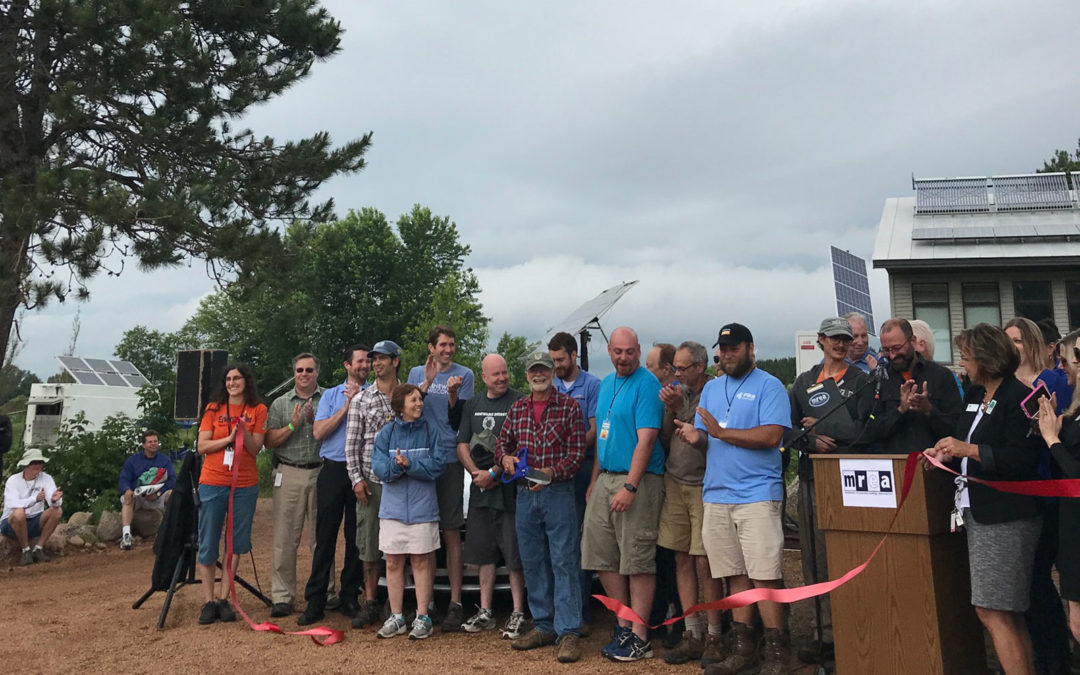
by Jodi Jean Amble | Jun 28, 2018 | Events
We had a great time at the 2018 Energy Fair! Below are PDF links to RENEW staff presentations and some image highlights of our weekend.
RENEW Staff Presentations
An overview of the current renewable energy and distributed generation policy landscape in WI, and its impacts on the solar, wind, hydropower, and biogas markets. The presentation included current and potential legislative and public service commission activities, as well as opportunities to advance policies that support the growth of renewable energy markets in WI.
RENEW Wisconsin’s Solar for Good program can help your nonprofit organization or house of worship install a solar array with grant funding, technical assistance, and publicity.
State energy policy empowers local governments to pursue clean energy. This will focus on recent public investments, city resolutions, and direct engagement with utilities for advancing renewable energy.
Wisconsin utilities are warming up to solar energy. We’ll examine the convergence of factors today that make large-scale solar farms appealing to utilities.
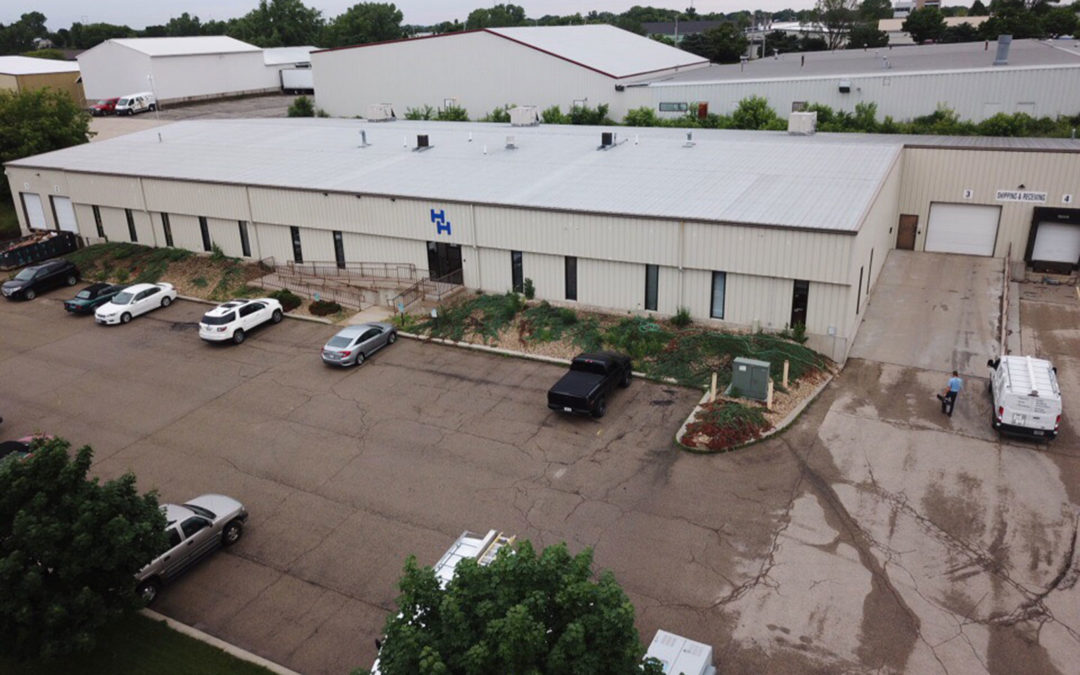
by Jodi Jean Amble | Jun 28, 2018 | Local Initiatives, PACE, Solar
The H&H Energy Services building located at 818 Post Road in Madison is the latest Wisconsin business to benefit from commercial Property Assessed Clean Energy (PACE) financing available through PACE Wisconsin. H&H Energy Services plan to offset the majority of their warehouse’s electrical use by installing roof upgrades, a 57 kilowatt photovoltaic (PV) system, along with rooftop heating and cooling units to the one-story 25,200 square foot building. Through the combination of energy savings and reduction in operating costs achieved through these improvements H&H Energy Services will offset the cost of the investment.
PACE is a means of financing energy and water efficiency upgrades, as well as renewable energy installations for commercial and industrial properties. PACE financing can fund up to 100% of the cost of eligible building improvements, and allows property owners to exchange equity with non-recourse financing. Financing options of up to 30 years yield positive cash flows, and increase the net operating income for commercial and industrial building owners. Financing costs can be passed on to tenants as part of their property tax, and therefore benefit tenants and property owners alike.
PACE Wisconsin is administered by Energy Finance Solutions (EFS), the financial services division of the Wisconsin Energy Conservation Corporation (WECC). “As an early adopter, H&H Energy Services will be able to use the benefits of commercial PACE financing as a competitive advantage in the market. Having gone through the PACE financing experience first-hand, H&H will be able to help their clients realize the benefits of this innovative project finance tool,” explained Jason Stringer, Senior Manager Clean Energy Finance for WECC EFS, and PACE Wisconsin Administrator.
The lender for the project is Greenworks Lending, a national lender that currently provides financing in 11 Commercial PACE enabled states. PACE Wisconsin currently works with thirteen lenders, of which four are located in Wisconsin. Thirty counties in Wisconsin have approved an ordinance to participate in PACE Wisconsin—meaning property owners in those counties are now eligible to apply for PACE financing. For more information on PACE Wisconsin and how it helps property owners, businesses, local governments, and contractors, visit pacewi.org.
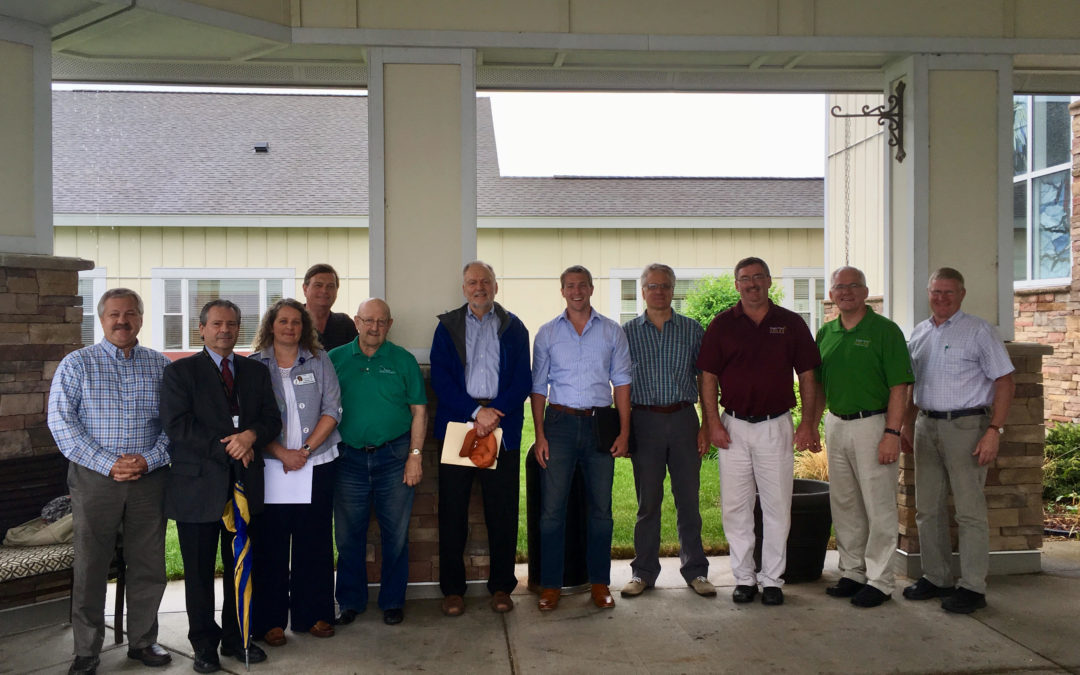
by Jim Boullion | Jun 11, 2018 | Focus on Energy, Solar
RENEW’s summer tour of renewable energy projects to help educate legislators and local officials about renewable energy continued on May 30th, as I helped to coordinate a visit for State Senator Howard Marklein, Representative Ed Brooks and Jon Hochkammer of the Wisconsin Counties Association to the Sauk County Health Care Center to showcase a new solar project that was one of two arrays that were approved last year by the Sauk County Board.
The project was made possible through the use of a third-party investor that allows the county to benefit from the projects without any upfront cash outlay. Eagle Point Solar, who built the project, is also the initial investor/owner of the installations. Financing for the project, which included a Focus on Energy grant, provides an option for the county to purchase the arrays after seven years and potentially save money on their utility bills. The cumulative cash flow savings from both projects over a 25-year period is projected to be more than $550,000 for the county!
As quoted in a local newspaper story, Mark Hanson, director of sustainable services for Hoffman Planning, Design and Construction who helped coordinate the project said “It is groundbreaking for a Wisconsin county because some counties are just getting into it with this combination of both the solar and third-party financing.”
Eagle Point Solar General Manager Jim Pullen said from an investor’s standpoint, there are advantages to having another party in the project. “We have the ability to monetize the tax credits and monetize the depreciation and therefore our cost to build this solar array is less than if the county just wrote us a check,” Pullen said. “Therefore we pass that lower cost back to the county by way of a lower energy rate.”
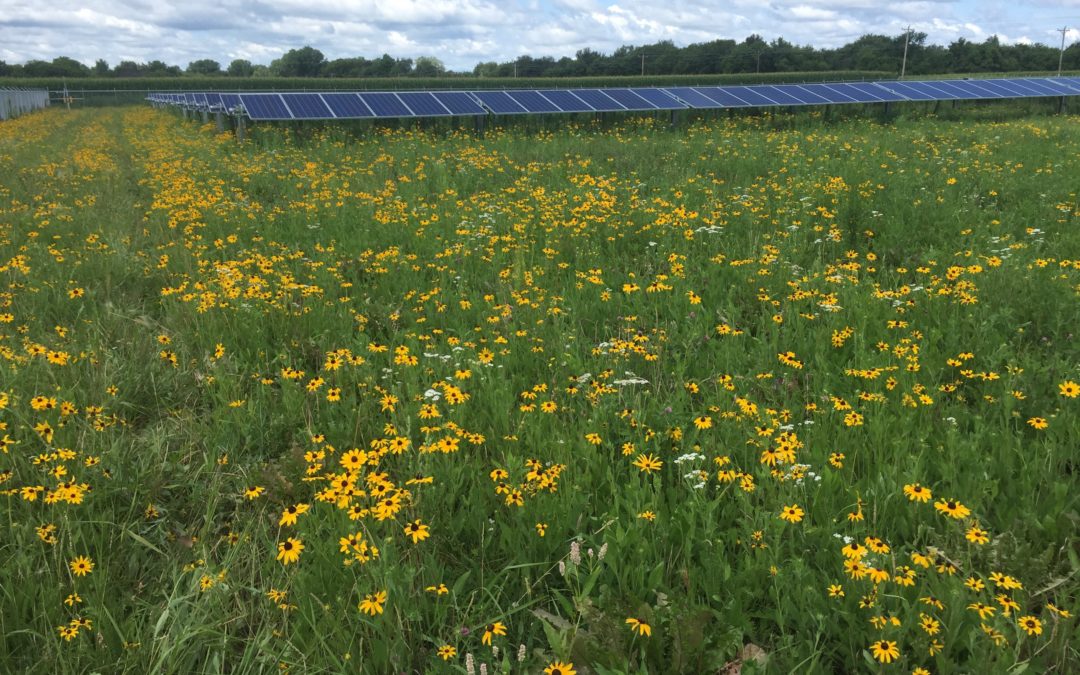
by Tyler Huebner | May 31, 2018 | Solar, Utilities
Today, Wisconsin Public Service (WPS) and Madison Gas & Electric (MGE) announced they propose to acquire 300 megawatts (MW) of solar power at two different locations in Wisconsin. In addition, the developers of the two facilities filed their formal proposals with the state’s Public Service Commission.
The projects are as follows:
• Badger Hollow Solar Farm in Iowa County in southwest Wisconsin near the villages of Montfort and Cobb. This project may be as large as 300 MW, of which 150 MW will be acquired by WPS and MGE.
• Two Creeks Solar in Manitowoc and Kewaunee Counties in the Town of Two Creeks and the City of Two Rivers. This project will be 150 MW.
WPS will own 100 MW shares of each project (200 MW total) while MGE will own 50 MW of each project (100 MW total). The electricity production from the utility-owned facilities announced today would equal the annual electric usage of approximately 67,000 Wisconsin homes, and will provide approximately 1% of Wisconsin’s annual electricity production. This amount of solar will more than triple the solar power capacity currently online in Wisconsin.
RENEW Wisconsin Executive Director Tyler Huebner said: “This is a landmark day for solar power and renewable energy in Wisconsin. Homeowners, businesses, and nonprofits have been enjoying the benefits of solar energy for years. We are excited that our power companies and these solar developers are making investments at scale to power Wisconsin with more home-grown clean and renewable energy.”
Read more:
Wisconsin State Journal
Journal Sentinal
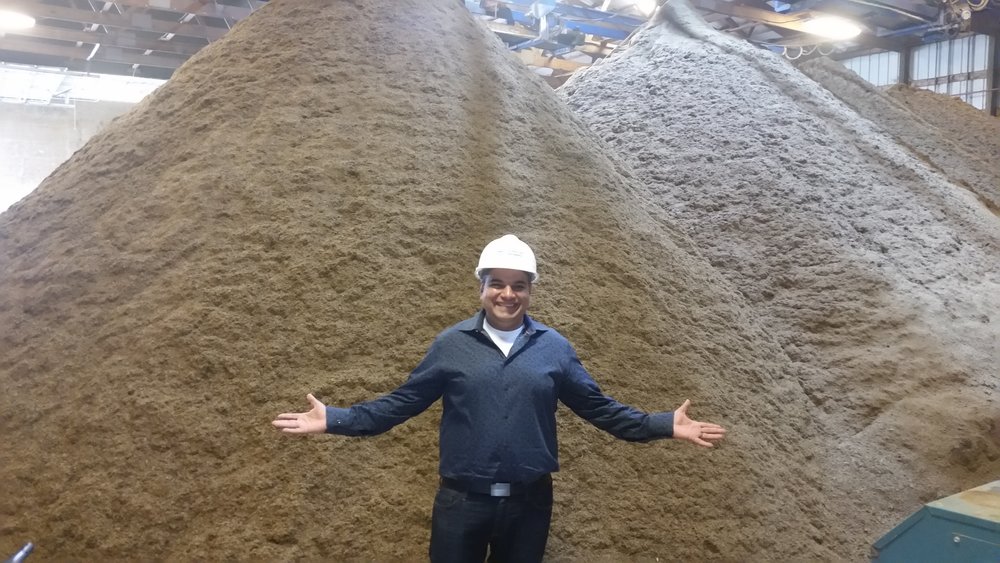
by Michael Vickerman | May 21, 2018 | Biogas, Local Initiatives
In early April, Yogesh Chawla was elected to Dane County Board of Supervisors, representing portions of Madison’s East Side and the Town of Blooming Grove. Less than a month following his election, Supervisor Chawla toured a biodigester facility in the Town of Vienna near Waunakee along with Dane County Executive Joe Parisi and his staff. Clean Fuel Partners, a RENEW business member, owns and operates the seven-year-old facility, which was the first farm-based community biodigester project designed and built in Wisconsin. Dane County took the lead in developing that project, and followed that up with another in the Town of Springfield.
Dane County’s substantial investments in farm waste-derived biogas is the centerpiece of a broader strategy to support local dairy farms and healthy lakes. The biodigester system that Chawla visited reduces the volume of phosphorus runoff into its lakes as well as displaces fossil fuel use with a local renewable energy source. From his appointments to the Environment, Agriculture and Natural Resources standing committee and the Land Conservation Committee, Supervisor Chawla is well-positioned to guide Dane County’s future efforts to clean up its lakes and farmlands through methane capture.
Read more about Yogesh Chawla’s tour HERE.
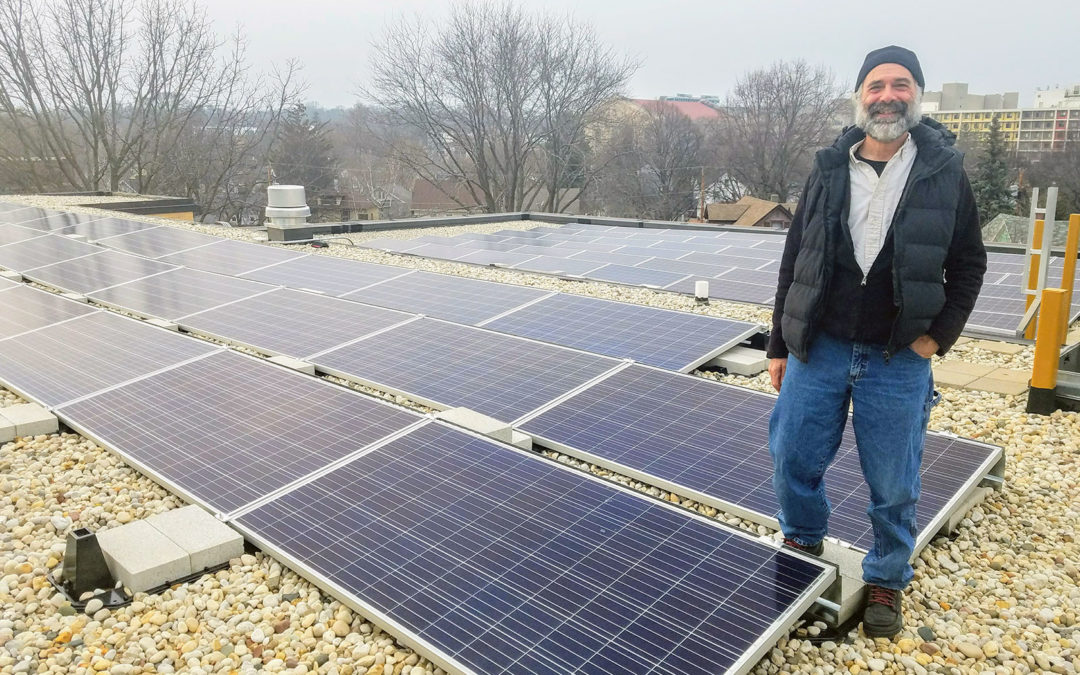
by Tyler Huebner | May 10, 2018 | Programs, RENEW Wisconsin, Solar for Good
RENEW Wisconsin’s Solar for Good program is issuing grants to 15 Wisconsin nonprofit organizations to install new solar electric systems. The grants total over $145,000 and will fund 10% to 20% of each organization’s project. The overall value of these new solar arrays is set to exceed $1.2 million.
Planned for installation over the next twelve months, these projects expect to add over 460 kilowatts (kW) in new solar power. The size of each project will vary based on the needs of the organization.
This is the second round of Solar for Good grants, following Fall 2017’s inaugural opportunity when sixteen organizations were offered grants. The program is primarily funded by solar philanthropists Cal & Laurie Coulliard of Deerfield through their Coulliard Solar Foundation.
“Nonprofit organizations are leaders, gathering places, and signs of hope across our Wisconsin communities. By helping them produce their own solar energy, we are empowering them to showcase solar energy’s capabilities and continue their leadership role for the people they serve. We are very proud of these nonprofits and can’t wait to see their shining solar projects get completed!” said Tyler Huebner, RENEW Wisconsin’s Executive Director.
The following organizations have been offered Solar for Good grants to install new solar electric systems:
Alice’s Garden, community and urban farm, Milwaukee
Community Homestead Inc, special needs organization, Osceola
First Unitarian Society of Madison, house of worship, Madison
Heartland Housing Inc., community housing, Milwaukee
Heartland Montessori School, early childhood education, River Falls
Heckrodt Wetland Reserve, outdoor education program, Menasha
Memorial United Church of Christ, house of worship, Fitchburg
Quasimondo Physical Theatre, arts education and training, Milwaukee
St. Bridget Catholic Church, house of worship, River Falls
VFW Post 8483, veterans service organization, Madison
Walnut Way Conservation Corp, environmental conservation organization, Milwaukee
Worldbuilders Inc., humanitarian organization, Stevens Point
Two organizations have asked to remain anonymous at this time.
Solar for Good plans to issue another round of grant funding in fall 2018. Individuals who want to learn more about the program can visit our website.
About RENEW Wisconsin
RENEW Wisconsin is a nonprofit organization which promotes renewable energy in Wisconsin. We work on policies and programs that support solar power, wind power, biogas, local hydropower, and geothermal energy. More information is available on RENEW’s website.
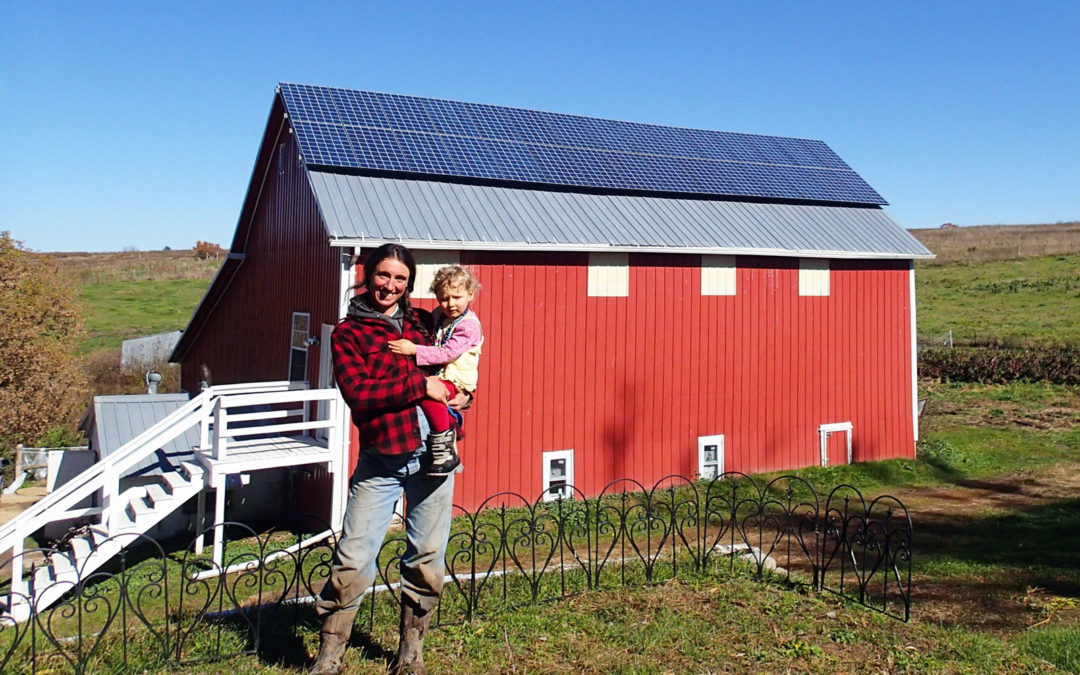
by Tyler Huebner | May 3, 2018 | Biogas, Focus on Energy, Geothermal, RENEW Wisconsin, Solar
Focus on Energy’s Renewable Energy Program Funded for 2019-2022
Today, the Public Service Commission of Wisconsin made preliminary decisions to allocate approximately $5.5 million in incentives per year to the renewable energy programs within “Focus on Energy” for the years 2019 through 2022.
The decisions came as part of the four-year planning process for the Focus on Energy program. Focus on Energy delivers incentives and education to help utility customers reduce energy usage and save money through energy efficiency and renewable energy technologies and projects. The total budget for the statewide Focus on Energy program is approximately $100 million annually.
RENEW Wisconsin’s Executive Director Tyler Huebner stated, “Today’s decisions to fund the Focus on Energy renewable energy incentive programs at adequate budget levels will set up the solar, geothermal, small wind, and bioenergy markets for a successful four-year period. We advocated for a consistent, predictable program and the PSC delivered, which is a win for customers and the growing industry of small businesses who do this work all across the Badger State. Based on recent experience, this level of funding should incentivize approximately 2000 homes and perhaps 600 or more businesses and nonprofits as they pursue renewable energy projects throughout the next four years.”
“Renewable energy creates jobs in Wisconsin, develops home-grown power sources, and enables a cleaner environment for future generations,” said Huebner.
Today’s verbal decisions and discussion:
• Allocated approximately $5.5 million per year for renewable energy incentives for 2019-2022.
• Established that four sub-markets will be served: residential, small business, mid-sized business, and larger business projects. The mid-sized business program will be new for 2019. Nonprofits and local governments fall into the “business” categories as well.
• Allows flexibility to meet market demand in these four sub-markets
• The residential and small business programs will continue to be first-come, first-serve programs. The mid-sized business and large business programs will start out being run through a request-for-proposal process.
• A study being conducted on the renewable energy programs may inform improvements to the program when it is completed.
• Opportunities to support rural and agricultural communities using $5 million in unspent funds will be explored, with a staff memorandum on possible options to be developed by July 1. $20 million was previously allocated towards biodigesters, with $15 million being awarded to the BC Organics project in Brown County in 2016.
“The Commissioners definitely heard the collective comments of our industry and stakeholders to make the renewable energy program as streamlined and business-friendly as possible. RENEW Wisconsin will continue to work with the Commission, PSC staff, and the Focus on Energy program administrators to make the programs simple for customers and the renewable energy marketplace, while ensuring cost-effective outcomes,” said Huebner.
Want to champion renewable energy victories like this?





